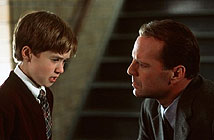|
|
|
|
The
Sixth Sense
|
 |
|
The measure of a film's quality can sometimes be gauged by the problems that the market has in labelling it. What is The Sixth Sense, exactly? One grasps for a hybrid denomination that wildly touches all bases: a supernatural horror-suspense fantasy mixed with elements of psychological thriller, family melodrama, metaphysical reverie and sentimental romance. That will do for starters. The young writer-director, M. Night Shyamalan, made two previous, little-known features, but The Sixth Sense catapulted him to instant prominence. And little wonder: it is a constantly intriguing and surprising piece, almost impossible to predict from one scene to the next. Few films so completely defy synopsis. Suffice to say, it concerns a child psychologist, Malcolm (Bruce Willis), and his efforts to make up for past professional miscalculations by curing a disturbed child, Cole (Haley Joel Osment), who believes he can see, hear and relate to ghosts. Part of the spell woven by this movie is due to the subtle mystery generated by each of its more earth-bound sub-plots concerning family relationships. The troubled marriage of workaholic Malcolm and his melancholic wife, Anna (Olivia Williams); the valiant efforts of no-nonsense Lynn (Toni Collette) to be a good mother to Cole – what secrets or keys are held inside these vignettes? As in David Cronenberg's eXistenZ (1999), Shyamalan takes the risk of introducing slightly improbable details and incidents – seeming errors or miscalculations that find their retrospective rationale in the greater design of the film. On every level, it is a superbly controlled and focused work. The Sixth Sense is in fact so absorbing as an unfolding narrative that it is easy to overlook its major novelty – the almost total absence of special-effects, beyond a few touches of make-up. The film is old-fashioned in the best possible sense: it recreates the era of Val Lewton's supernatural fantasies (such as Curse of the Cat People, 1944), where a mere shadow under a door or a silhouette passing swiftly through the background of a shot was enough to inspire both terror and poetic wonder. Shyamalan seems to be inspired by two different, conflicting traditions in the horror-fantasy genre. He handles the transitions between them smoothly, but also evasively. On the one hand, this ghost story owes something (especially in its opening stages) to the Gothic mode as updated by David Lynch in his TV series Twin Peaks: evil spirits who do mean, nasty, perverse things (particularly to children) in the name of payback, malign revenge. This colder, crueller edge of the plot reaches an unforgettable peak in a revelatory scene. The film artfully alternates between this dread-filled perspective and another – a more sentimental apprehension of the spirit-world redolent of the visions of Spielberg or the screenwriter Bruce Joel Rubin (Ghost, 1990). This latter mode also packs its emotional punch but, whenever it overwhelms proceedings, certain dark issues and implications are conveniently erased from the story's subtext. At the start, The Sixth Sense insinuates itself into the viewer's mind as one of those rare films that is of no genre, or confounds the usual genres – in the precious company of such gems as Peter Weir's Fearless (1993) or Michael Tolkin's The Rapture (1991). By the end, it has become quite a bit more normal and conventional, which is a pity. It is, nonetheless, an impressive and satisfying entertainment. MORE Shyamalan: The Village © Adrian Martin October 1999 |
![]()